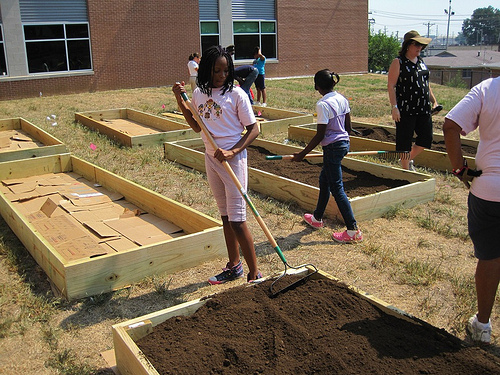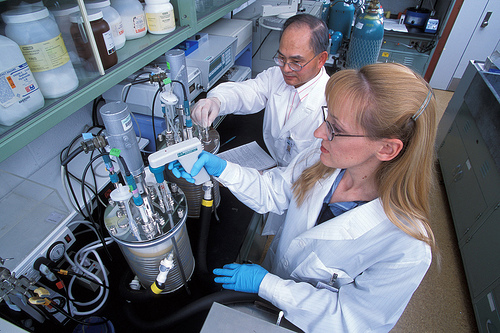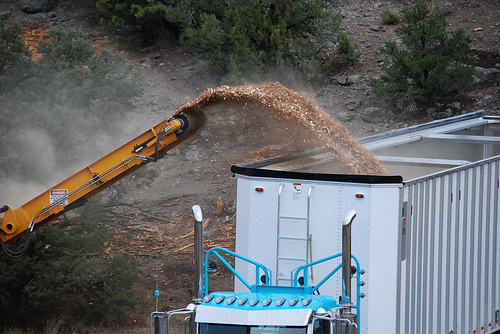
Students at Barack Obama Elementary School, near St. Louis, learn about healthy food choices through gardening.
Acting Deputy Undersecretary for Rural Development Judith Canales recently had the opportunity to visit Missouri’s new Barack Obama Elementary School located in a suburb of St. Louis. The school district has started the Barack Obama Elementary Healthy Food Pilot Project where the objective is to serve a healthier school breakfast and lunch menu. As part of this pilot project, the Farm to School Program is being incorporated to bring in more locally grown produce. The elementary school has also created a school garden in partnership with community members, community-based organizations, and a local community gardening group. It appears that they are on the right track! Read more »
Late last week, Agriculture Secretary Tom Vilsack went to Omaha, Nebraska to discuss the President’s “All of the above” energy strategy, and meet with wind energy and rural development officials. Speaking to members of the American Coalition for Ethanol, he said that while the drought is severe and the Obama Administration is moving to help affected farmers and ranchers, we won’t know the impact of this drought until harvest time – but we do know that working together, we will get through this challenge.
The Secretary noted that Nebraska has been hit hard by drought. Today, USDA declared an additional 172 additional counties across the United States as primary natural disaster areas due to drought – and as of today, all of the State of Nebraska is covered by primary or contiguous disaster designations for drought.
Read more »

Agricultural Research Service chemist Tsung Min Kuo and technician Karen Ray convert vegetable oil into antifungal agents and other value-added bioproducts.
This post is part of the Science Tuesday feature series on the USDA blog. Check back each week as we showcase stories and news from USDA’s rich science and research profile.
Emerging bioenergy systems hold the promise of helping to reduce our dependence on foreign oil, increase economic prosperity, and reduce greenhouse gas emissions. The National Renewable Fuel Standard mandates the production of 36 billion gallons of biofuels be produced annually by 2022; of which 16 billion gallons must come from fuels that are not corn-based ethanol. These fuels, produced from the conversion of grasses, wood, and oilseeds and other biomass, must be produced in a sustainably and economically efficient manner. To meet this goal, USDA has developed a Bioenergy strategy, focused on research, development, education, and extension. As part of USDA’s Office of the Chief Scientist series of white papers on the Department’s research portfolio, this plan aligns USDA’s biofuels research with the goals of President Obama’s Blueprint for a Secure Energy Future. Read more »
As drought continues across America, President Obama and I continue doing all we can to help farmers and ranchers. Last week, at the President’s direction, I convened a meeting of the White House Rural Council to ensure we’re doing all we can – and we’ll meet again to discuss drought in the coming days.
We’ll also continue to call on Congress to pass a Food, Farm and Jobs Bill as soon as possible, to give USDA more tools to help and to give more certainty to producers in this difficult time.
Meanwhile, at USDA we continue our work to help grow the economy and create jobs. This includes our support for innovative producers and rural businesses who are already working hard to boost the emerging bio-economy.
From household products made of homegrown crops, to remarkable advanced biofuels that are powering America’s ships and aircraft, the bio-based economy is strengthening our nation while bringing more jobs and economic security to rural America.
Today, more than 3,000 companies are producing more than 25,000 biobased products made from renewable sources grown here at home, and supporting 100,000 American jobs. These companies are developing a wide variety of products – from cleaners and paints to construction materials – for use at home, at work, and by industry. Read more »

A truck is filled with wood chips as part of the process of turning wood into energy
Cross posted from the White House CEQ blog:
Across rural America, biomass like wood pellets and wood chips is helping communities diversify their energy sources, create jobs, and save money on utility bills. At the Forest Service, we are working to support biomass projects that help us manage wildfire threats, and also serve as economic engines for rural communities. Last week, USDA Secretary Tom Vilsack announced grants of $4 million for renewable wood energy projects that will provide 20 small businesses, tribes and community groups with the technical engineering and design services they need to explore installing wood heat and electricity projects. Read more »

The U.S. Forest Service recently announced nearly $4 million in grants to help develop affordable woody biomass energy in rural communities. The facilities will use wood pellets such as those pictured here. Thinkstock
The U.S. Forest Service recently announced the award of nearly $4 million in grants for wood energy projects around the country to help expand regional economies and create new jobs. The grants, totaling $3.9 million, will be distributed to 20 small businesses, tribes and community groups to develop renewable energy projects. Read more »




